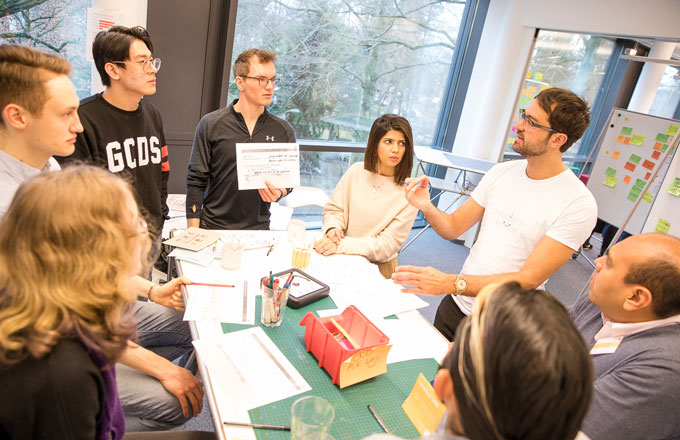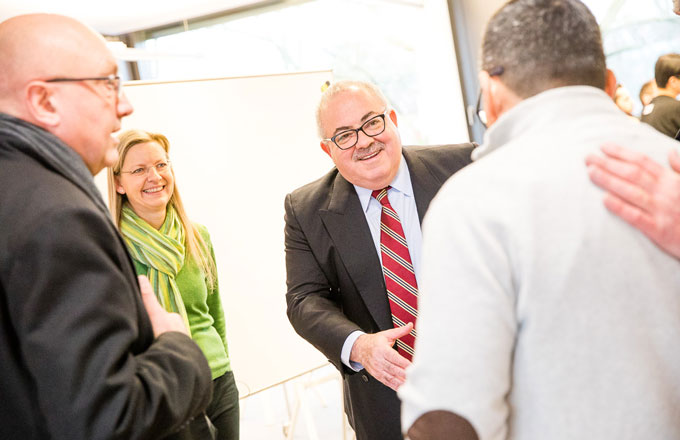Global Design Thinking Week: Designing for Global Impact
Giving young people access to education is a key factor for the development of countries and their economies to thrive. However, the privilege of education is not a given everywhere. At the Global Design Thinking Week 61 participants from 16 countries developed new educational concepts for socially disadvantaged young people who have limited access to higher education and are likely to be hit by unemployment, with a focus on Mexico.
To address the challenge of youth unemployment, ten multidisciplinary Design Thinking teams focused on insights from Germany and Mexico. They were supported by our project partner BDI (Federation of German Industry), and a 20-people delegation of Mexican networking partners from Mexico Tecnológico de Monterrey (ITESM) Campus Guadalajara, Instituto Politécnico Nacional (IPN), Ministry of Innovation of Jalisco, City of León, Labour Institute Guanajuato (IECA), COPARMEX, USEM, and CONCAMIN. Together they were looking for a holistic solution to help stabilize the social, economic and socio-political development in Mexico.
How important this collaboration between Mexico and Germany is, was highlighted by Rogelio Granguillhome Morfín, the Mexican Ambassador to Germany, who visited the HPI D-School during the Global Design Thinking Week. "The future is what we make of it. It is up to us, to our creativity, how positive and transformative we want it to be. Do not forget that it is by working together, academy, private sector, government and civil society, that we can make this world a better place", he said in a speech to the participants.
Changing skill-sets and unfolding potentials
As digitalization causes changes of job profiles in numerous industries, young people require different skill sets to match the job market. Giving them the right skills to profit from digital transformation is a key task for education and society.
During their research, our Design Thinking teams spoke with schools, local businesses, job centers and initiatives that support young people in finding a job. They found that there is currently a large gap between the skills schools provide and the skills businesses need their apprentices to bring. Moreover, they learned that students are not necessarily unmotivated to learn or work but that it is important for them to find something they are passionate about. But how can schools, businesses and governments collaborate to close this gap and unfold the potential of socially disadvantaged young people? How can we empower students to identify their talents and passion for specific fields?
By applying Design Thinking the international participant teams developed innovative concepts to transform the educational experience for young people in Mexico. Their ideas range from mentoring initiatives for students to meet local businesses, or an artificial intelligence that matches students and companies based on their skills and skill requirements, to an incubator program where students can acquire skills they don’t learn at school to be ready for the job market.
Each of the teams approached the challenge from a different angle and found solutions with for specific target groups. One team for example developed a special mentoring program to encourage, inspire and guide Mexican girls to pursue a career in technology by matching them with female role models from Mexico. Another team developed a completely new school concept that is based on modules and giving students the freedom to experiment, specialize and become an expert in specific fields they are passionate about.
Watch the review video by Uli Weinberg with impressions of the Global Design Thinking Week (scroll and click):
These concepts provide food for thought and inspiration to shift educational systems and unfold the potentials of young people not only in Mexico and Germany but globally.
About the Global Design Thinking Week:
Design Thinking goes beyond a set of tools and methods for human-centric innovation processes. During the Global Design Thinking Week, multidisciplinary teams and a diverse coaching team address the leading principles of Design Thinking as a mindset to ignite and challenge innovation and lead change on a sustainable scale.
Photos: Jana Legler / HPI School of Design Thinking, Video by Uli Weinberg


